Do Air Filters Make A Difference
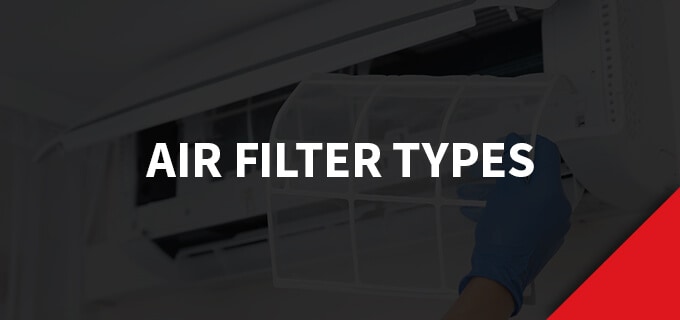
Indoor air quality is a crucial chemical element for any homeowner, especially if members of your household have respiratory problems. Proper HVAC filters tin make the difference between stuffy air filled with pollutants and clean air that's healthy and easy to breathe. Understanding the dissimilar air filter types for homes is the first stride to getting the improved indoor air quality yous deserve.
What Are the Dissimilar Kinds of Air Filters?
There are seven ordinarily used dwelling air filter types:
- HEPA filters
- UV light filters
- Electrostatic filters
- Washable filters
- Media filters
- Spun glass filters
- Pleated filters
Each of these filters has its own set of pros and cons, which vary based on your goal for your abode. Some people need HVAC organization filters that will proceed the air free of allergens and other pollutants, while others just need a bones filter to go the job washed. By and large, high-efficiency filters that are also toll-effective are best for homes, but other considerations should include whether there are pets in the home, whether mold or mildew is a threat and how frequently the filters should exist changed.
The materials air filters are made of vary from fabrics to fiberglass. Filters are also rated using the Minimum Efficiency Reporting Value (MERV), which was developed by the American Guild of Heating and Refrigerating and Air Conditioning Engineers (ASHRAE). The ratings range from 1 to 16 and give you an thought of how well the filter can trap pollutants that are as small-scale as 0.three microns and as large every bit 10 microns, with xvi existence the nigh effective.
Air Quality Services in Central PA
Which Filter Type Is Best for Your Home?
Non all filters are built the same, so choosing the right filter depends on what you lot need to purify from the air. You'll also want to consider factors similar the cost of the filters. It'due south wise to speak to an HVAC professional before making whatsoever decisions about air filters. To aid gather data and weigh your options, y'all can compare the basic pros and cons of each filter type. Let'due south take a look at each filter type and its characteristics to narrow downwardly the types that may exist a good fit for your habitation.
ane. HEPA Filters
High-efficiency particulate air (HEPA) filters are recommended by the U.S. Department of Health because they are able to remove at to the lowest degree 99.97% of airborne allergens and pollutants — including mold spores and grit that are every bit modest every bit 0.3 microns. With a MERV rating nearing 16, HEPA filters provide the highest protection for your dwelling. They're able to remove even the smallest microns or airborne particles, including tobacco and bacteria.
Those who live with allergies or other respiratory bug may benefit from HEPA filters the well-nigh. These filters do need to be adjusted by a contractor to fit your specific HVAC system.
HEPA FILTERS PROS AND CONS
- Pros: The biggest pro of HEPA filters is how effectively they purify the air. The design of these filters makes it platonic for capturing larger pollutants, like pet dander and pollen. These filters are also fairly cost-effective and only demand to exist changed every few years.
- Cons: While they're keen at ridding your domicile of about pollutants, in that location are still some pollutants HEPA filters are helpless against. Fumes, gasses and odors are besides pocket-size for HEPA filters, and pollutants similar mold spores may settle on the filter itself, reducing its effectiveness and probable requiring replacement sooner than expected.
2. UV Filters
As their proper name suggests, UV filters employ short-wave ultraviolet light to kill bacteria and viruses. When air passes through the HVAC unit of measurement, the UV lamps disinfect information technology with germicidal radiation. UV filters are excellent for killing microorganisms that could be hazardous to your health, including mold spores.
One potential danger of UV filters is that they can transform oxygen into ozone, which tin can be hazardous for your wellness. Even low amounts of ozone can cause coughing and chest pain, while higher amounts of it tin lead to worsening of existing respiratory diseases, like asthma.
Though UV filters are great at eliminating bacteria and viruses, they're not equally efficient when information technology comes to screening against pollutants similar dust. This is why they are frequently part of a larger filtration mechanism, which includes HEPA air filters. The UV light is invisible to the human being eye, and the lightbulbs generally need to be replaced every yr, depending on the make and model of the HVAC system.
UV FILTERS PROS AND CONS
- Pros: The UV calorie-free used in these filters is able to kill tough pollutants similar mold and germs, giving you exceptional indoor air quality to assist forestall diseases and respiratory illnesses.
- Cons: On elevation of being fairly costly to install, UV filters are unable to rid the air of more mutual pollutants, like grit or allergens. They're also ineffective against gases, fumes and cigarette smoke.
iii. Electrostatic Filters
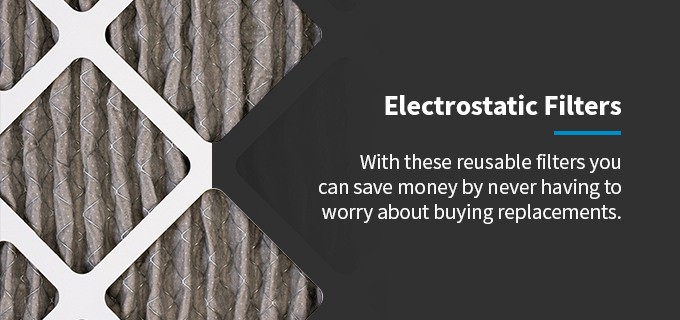
Using modest cotton and paper fibers, electrostatic filters create static that acts every bit a magnet for dust and other airborne particles. The magnetism is stiff plenty that it keeps these particles from spreading throughout your habitation, making them ane of the best choices for those who need a filter that tin gainsay allergens.
An added bonus for electrostatic filters is they are bachelor as disposable as well as reusable. When it comes time to change the filters, you can decide whether to wash and reuse them or toss them and get brand new ones.
ELECTROSTATIC FILTERS PROS AND CONS
- Pros: Regardless of whether you cull the dispensable or reusable choice, these filters are some of the most cost-effective options on the market. An added bonus of reusable filters is that yous can salvage money by never having to worry nigh buying replacements. Plus, these filters are great at improving indoor air quality.
- Cons: While this filter handles smaller pollutants, information technology may struggle to filter larger ones, such as dust or mold spores. This makes electrostatic filters a poor pick for people who take respiratory bug.
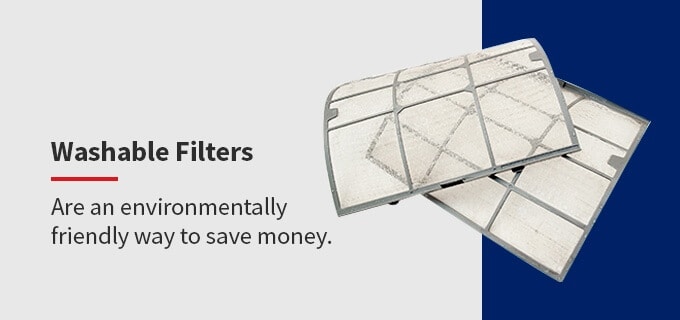
iv. Washable Filters
While certain types of air filters come with reusable and disposable options, washable filters are an environmentally friendly way to save money. The initial price of this air filter type for HVAC systems is high, but information technology should exist viewed as an investment that will final for many years. The initial price is probable all you'll have to pay as you can just wash and reuse the filter over and over once more instead of buying new ones every few months.
Washable filters need to be maintained well to ensure they work equally they should. As one of the main types of air filters, they come with maintenance instructions that should be followed. It's very important to make sure the filter is fully dry earlier putting it dorsum in. Even the slightest bit of wet left can lead to mold and mildew developing on the filter and being expelled into the air y'all breathe.
While these filters take a low MERV rating, they are a great long-term investment for someone who doesn't have strong preferences about HVAC filter types and doesn't need any specialty filters.
WASHABLE FILTERS PROS AND CONS
- Pros:The best affair nearly a washable filter is you just need to buy it once, and information technology will likely concluding for the life span of your HVAC organization. This makes washable filters extremely cost-effective and helps reduce waste.
- Cons:For washable filters to keep doing their chore they need to be maintained regularly, which means removing and washing the filter and letting it dry fully before reinserting it. Failure to maintain a washable filter will reduce its effectiveness, especially if you're rushed and reinsert it without proper drying. The wet or clammy filter will grow mildew and mold, which can make your indoor air quality worse.
5. Media Filters
When it comes to air filters for HVAC systems, media filters can provide more than benefits than standard filters with high MERV ratings. Media filters provide the same level of filtration equally a high-MERV filter, just they do it without the negative consequences of airflow or static pressure. Instead, media filters accept a greater surface area, which successfully prevents meaning static pressure while providing improve filtration.
Media filters are very easy to maintain and neat for filtering bacteria and other small airborne pollutants. The filtered clay is sealed into the filter, preventing information technology from being expelled back into your home. Media filters are also sturdy and toll-effective, needing to be changed as infrequently as once or twice a year.
MEDIA FILTERS PROS AND CONS
- Pros: These filters are pop for their low maintenance since they only need to be changed in one case or twice a year. They're great at filtration thanks to their increased expanse, and they as well trap pollutants rather than sending them back into the air.
- Cons: Media filters likely need to be professionally installed, and they're ineffective when it comes to filtering odors.
half-dozen. Spun Glass Filters
Strands of fiberglass are spun together to create this type of filter, which is one of the nearly common types of HVAC filters. It makes for i of the best Ac filter types because it is cost-effective, disposable and information technology protects air conditioners and furnaces from droppings. Of the dissimilar types of AC filters available, spun drinking glass is one of the most effective. Only if you're seeking an air purifier, a more high-tech selection would be more than suitable.
These filters aren't known for improving air quality since they are unable to strain very much and can only trap some dust and allergens. For this reason, these filters aren't recommended for people who have respiratory problems and need a filter that volition improve the indoor air quality.
SPUN GLASS FILTERS PROS AND CONS
- Pros:The main selling bespeak for spun glass filters is their price — they're one of the cheapest on the market. Spun drinking glass filters are likewise infrequent at catching and filtering late debris, like lint and dust.
- Cons: Considering spun glass filters have a smaller surface area, they are ineffective in filtering smaller pollutants. This makes them a poor selection for those who alive with asthma and other respiratory illnesses. They besides present the take a chance of getting clogged and negatively impacting airflow, especially if you fail to supplant them regularly.
7. Pleated Filters
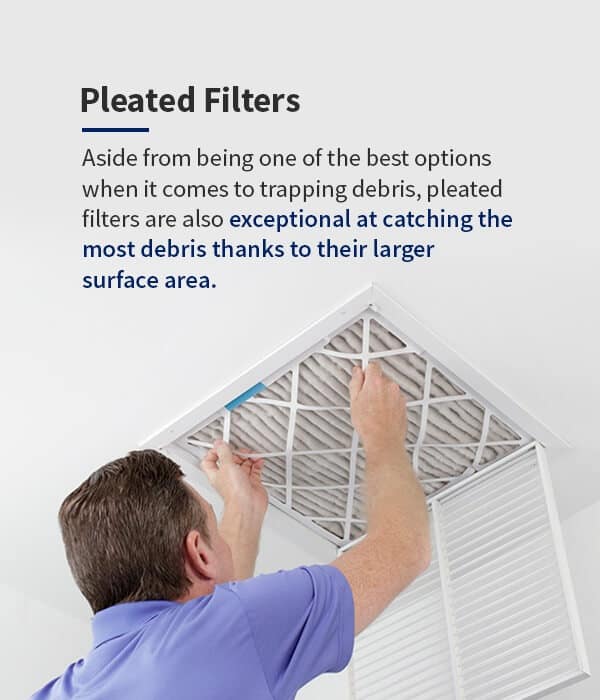
Polyester fabrics or cotton folds are two HVAC filter materials used in pleated filters. Pleated filters have a MERV rating between 5 and 13. While they tin can effectively filter dust and other airborne pollutants, they provide low air filtration and are less resistant to airflow.
The pleats in these filters requite them an advantage over non-pleated options because they increment the filter'south surface area for improve filtering. Filters with more pleats will provide improve filtering than those with fewer pleats, trapping even difficult allergens and pollutants, like pet dander and mold spores. Pleated filters are also available in reusable and disposable formats, and they can assist suppress the noise of the HVAC fan.
The downside to these filters is that they require your HVAC organisation to piece of work a little harder to pull air through the unit, which may issue in your HVAC system losing efficiency sooner than expected. Considering pleated filters improve the air quality of your home slightly, they're a reasonably-priced selection for people who are concerned with indoor air quality.
PLEATED FILTERS PROS AND CONS
- Pros: Aside from beingness i of the all-time options when information technology comes to trapping debris, pleated filters are besides exceptional at catching the virtually droppings cheers to their larger area. Pleated filters also last longer, requiring fewer replacements, and the used filters can be recycled.
- Cons: The but downside to pleated filters is their cost. They're some of the more than expensive options on the market. Nonetheless, they're also a slap-up way to get your coin's worth.
What Size Filter Do I Demand?
HVAC filter sizes are allotted by the filter's thickness, also known as the depth, in addition to its height and length. There are standard sizes, just the exact filter size will depend on your HVAC arrangement and its specifications. The all-time fashion to figure out what size filter you need is to remove the existing filter from your HVAC organization and check for its dimensions on the filter frame. Y'all can also refer to your HVAC arrangement's user manual to find the appropriate filter size.
By and large, filters will accept a thickness of 1 inch for common systems and a thickness of 5 inches for larger HVAC systems. The overall size of the filter can vary from a meridian and length combination of 10 inches by 10 inches to xxx inches by 30 inches.
Some of the nearly common sizes are:
- 14 inches by 25 inches
- xvi inches by 20 inches
- 16 inches past 25 inches
- 20 inches by 25 inches
- 25 inches past 25 inches
No filter is universal, so it's important to make sure the filter you purchase is the right size to fit in your HVAC organisation.
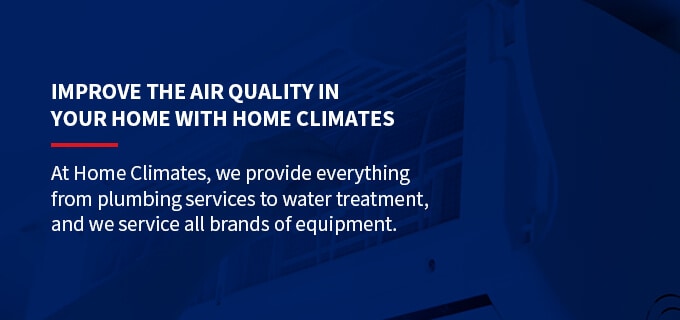
Improve the Air Quality in Your Habitation With Home Climates
Indoor air quality is an important function of maintaining your health, and Home Climates is dedicated to offering over-the-superlative service for reasonable prices to ensure your habitation stays comfortable. If y'all want your air filter to terminate viruses then we recommend the REME Halo air purifier, which reliably purifies the air in your home to make it healthy for you and your family.
At Abode Climates, we provide everything from plumbing services to water treatment, and we service all brands of equipment. Because we want you to have the domicile you deserve, nosotros offering many promotions and financing options for your home comeback projects.
We are dedicated to providing professional person assist that improves your indoor air quality. We even offer a five-year warranty on labor. You can go in bear on with Home Climates 24/7 by calling 717-689-4151 or past making an appointment online. If you have questions about our services, our squad of professionals will be happy to assist you today.
Do Air Filters Make A Difference,
Source: https://homeclimates.com/blog/air-filter-types
Posted by: winklerwhadminvabot.blogspot.com


0 Response to "Do Air Filters Make A Difference"
Post a Comment